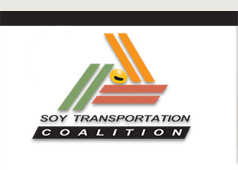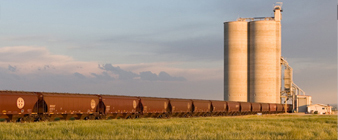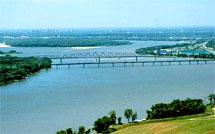 |
 |
|
| eNews • February 2011 | ||
| Promoting a Cost-Effective, Reliable and Competitive Transportation System |
||
 Shippers worry river may not be deep enough
Shippers worry river may not be deep enough
Lower levels of funding for dredging the Mississippi River south of Baton Rouge will have "a ripple effect" upriver, raising the cost of importing material from overseas and exporting American agricultural products, says a coalition concerned with river commerce.
The Corps of Engineers, which is responsible for maintaining minimum depths along the length of the river, may not be able to maintain a 45-foot depth for the deep-draft shipping channel from the Gulf of Mexico to Baton Rouge this year, but will keep the river open to navigation with available money, said spokesman Robert T. Anderson of the corps' Vicksburg district.
"There may be some restrictions on draft. There may be some restrictions on two-way traffic. But the fact that the channel is still open and barges and ships can still get to their ports is the goal," Anderson said.
That's a concern for members of the Big River Coalition and others committed to ensuring the maintenance of the river. The coalition is made up of shippers, port authorities and businesses and trade associations whose products are transported by water.
They point out that the river connects 14,000 miles of inland waterways to deep-draft ports, linking 29 states and Canada to the Gulf of Mexico and ports overseas. Deep draft ports on the Mississippi handle cargo worth more than $85 billion a year.
The corps has allocated $63 million for dredging the river south of Baton Rouge for the fiscal year that began in October, despite the fact that the five-year average actual cost has been $85 million and topped $127 million last year.
Big container ships coming into the river south of New Orleans can make it as far north as Baton Rouge before their cargoes must be transferred to barges, railcars or trucks.
Any choke point in the river would affect costs, but particularly one along the lower river, where four ports -- South Louisiana, New Orleans, Plaquemines and Baton Rouge -- are ranked first, sixth, 10th and 14th in the U.S. in cargo tonnage. If shippers have to resort to shallower-draft ships or fill deep-draft boats with less volume, it will affect profit margins and, perhaps, shipping options.
"It will have a ripple effect," said Port of Memphis director James R. "Randy" Richardson. "It could lower the amount of the volumes, which might have an adverse effect on the cost because, if you can't ship as much product, you don't get the volume discount and that's where water is really competitive against other forms of transportation," like rail and truck.
Like several others, Richardson sees the expansion of the Panama Canal in 2014 as a huge spur to trade and anticipates the return of containers on barges north to Memphis. Richardson says Memphis is poised to take advantage of the increased traffic with an ice-free port and access to Class 1 railroads and interstates.
The river at Memphis is dredged to a minimum 9-feet but is deeper more than 95 percent of the time, Richardson said. A drought in 1988 closed the river temporarily at Mason Landing, about 100 miles south of Memphis.
Port of Natchez director Anthony B. Hauer agreed. "If navigation availability is not perpetuated, there will be economic downturns," he said.
And Mississippi Department of Agriculture and Commerce director of marketing Andy Prosser said the river's access to export markets is critical for farmers who are, for the most part, not yet aware of the potential threat to their bottom lines.
"Any disruption in river traffic or load traffic or cargo traffic is going to trickle down to our local economy and to farmers," Prosser said.
Source: The Memphis Commercial Appeal
Soy Transportation Coalition |
|
